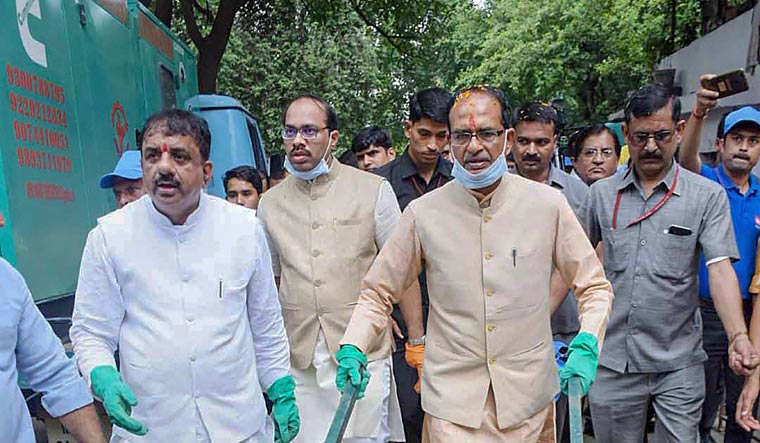Amid protests against the SC/ST Act in Madhya Pradesh by upper castes, the ruling BJP is fearing a backlash in the upcoming assembly elections. Upset over the anger of its traditional voters, Madhya Pradesh Chief Minister Shivraj Singh Chouhan made a surprise announcement on Thursday. He said that “misuse of amended SC/ST Act will not be allowed and nobody will be arrested without a thorough investigation”.
His declaration is considered an open challenge to the amendment to the Act by the Union government, bringing back the law in its original form. A joint forum of SC/ST and OBC communities termed the statement of chief minister as "unconstitutional’’.
In March this year, the Supreme Court ruled that the police cannot arrest anybody under the Scheduled Caste and Scheduled Tribe (Prevention of Atrocities) Act just because there is a case against him. The court’s decision came after the Union government gave an affidavit saying that it favours the top court's stand.
Related stories
- Narottam Mishra calls MP Congress chief 'liar'; accuses party of ignoring tribal issues
- Madhya Pradesh: After PM Modi's roadshow, Rahul to kickstart Congress campaign today
- Mahakal temple fire: District administration bans outside colours for Rangpanchami celebrations
- Mahakal temple fire: ‘Very painful’, says PM Modi; CM announces solatium of Rs 1 lakh
However, the Supreme Court order and the BJP’s stand triggered widespread protests in north India by dalit and adivasi organisations. The protests led to the killing of nearly a dozen people.
Later, in August, the Union government, owing to pressure from SC/ST communities, backtracked on its decision and introduced an amendment to the Act, turning down the Supreme Court's decision and bringing back the Act in its original form. The bill to overturn the top court order was unanimously passed by the Lok Sabha.
The amendment bill restored the original clause, which rules out any provision for anticipatory bail for a person charged under the Act. The Act envisages that no preliminary inquiry is required for registering a criminal case and an arrest.
The BJP's move to bring in an amendment and re-introduce the bill to restore the old clauses of arrest without investigation were vehemently opposed by several non-SC/ST organisations in Madhya Pradesh. The massive protests against the SC/ST Act and ruling BJP became so violent at places that the chief minister‘s cavalcade was pelted with stones and even slippers were hurled at him. Chouhan also faced the angry mob in districts like Sidhi, Ujjain Vidisha and Satna. Police had to resort to mild force in Satna when protesters showed black flags and flew black balloons. In Satna, police arrested even shopkeepers for selling black balloons.
With the assembly elections a few months away, the BJP and the RSS are worried about the fallout of the upper class anger against the ruling party. The saffron party has taken the matter so seriously that its national general secretary Ramlal flew to Bhopal to plan a strategy to contain the ongoing unrest against the government.
BJP is worried because a major chunk of those opposing the law has been the traditional voters of the party. The upper caste Brahmins, Thakurs, Banias—the business community—and even the OBCs were rallying against this Act.
The announcement of the chief minister on Thursday came as a surprise because, at national level, the BJP has taken a stand in favour of the SC/ST Act. Chouhan said that the home department would soon issue an order that arrest in such cases would not take place unless a proper investigation is done.
Ajay Gupta, chairman of the Congress legal cell in Madhya Pradesh, said, “The state government will have to go by the ordinance issued by the Central government. No changes can be made by the state government. The announcement made by the chief minister is illegal.”
While legal experts claim that such orders are illegal, Madhya Pradesh Advocate General Purushendra Kaurav claimed that the decision of the chief minister is not contradictory as government can issue administrative orders.



